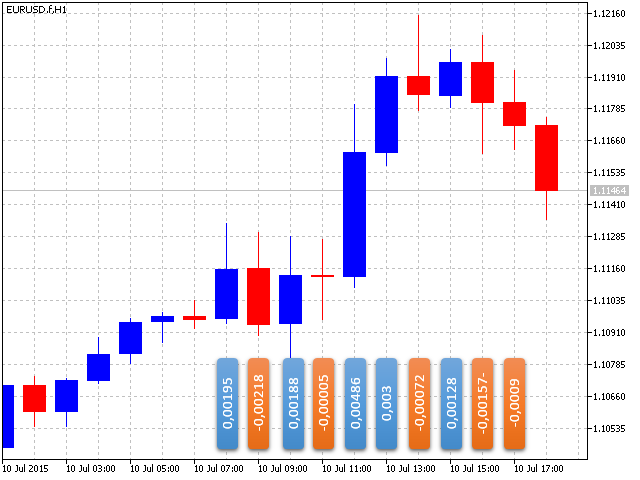There are some questions I would like to get to the bottom of:
- What is momentum in Forex?
- Is it possible to calculate momentum for a certain period of time without averaging the results over past periods of time?
- A strategy for dealing with momentum.
If there is a proper interest in the topic, I will post (if possible) pictures of the same design and size, and (in the plans) there will be a publicly available indicator. So, I'm waiting for suggestions on point 1.
So momentum is the speed of price change per time frame or the number of pips the price has moved per unit time. Since there is no tick history at the moment, we have to use timeframes. For now I propose to count the momentum as
Close[1]-Open[1]
and perform the calculation only once at the moment of a new bar appearing.
Added. It is possible to calculate the speed. But to understand that the calculated speed is the momentum or not, we need to compare this calculated speed with something.
Speed of price change, - for Forex, and for the stock market - speed of price change multiplied by volume.
Actually measuring the change in distance travelled by the price is not difficult. For now it's a figure, but I think it's better to output the impulse size as a histogram later on:

If you want the speed of price change, it is not momentum, but acceleration, i.e. the first derivative of speed over time.
Classical impulse from mechanics is the product of mass by velocity, but what is mass in terms of forex?
In the stock market, we can attach volumes instead of mass. But for forex it's not the same...
If you want the speed of price change, it is not momentum, but acceleration, i.e. the first derivative of speed over time.
Classical momentum from mechanics is the product of mass by velocity, but what is mass in terms of forex?
Mass - volume - already written ))
The velocity of the price is the speed of the price. Acceleration is the rate of change in velocity - the first derivative.
Mass - volume - already written )))
For the stock exchange, mass is roughly equivalent to volume, but forex volumes are not ))))
If you want the speed of price change, it is not momentum, but acceleration, i.e. the first derivative of speed over time.
Classical momentum from mechanics is the product of mass by velocity, but what is mass in terms of forex?
Knowing velocity (size of each candle) we can calculate acceleration for each candle. The dimension of velocity ( ). Acceleration will be (
). Acceleration will be ( ). Well, and momentum will be the derivative of acceleration. Isn't that right?
). Well, and momentum will be the derivative of acceleration. Isn't that right?
- Free trading apps
- Over 8,000 signals for copying
- Economic news for exploring financial markets
You agree to website policy and terms of use
There are some questions I would like to get to the bottom of:
If there is a proper interest in the topic, I will post (if possible) pictures of the same design and size, and (in the plans) there will be a publicly available indicator. So waiting for suggestions on point 1.
Enlarged:
Forum on trading, automated trading systems and trading strategy testing
Impulse
Karputov Vladimir, 2015.07.11 12:48
Refined figure:
Forum on trading, automated trading systems and trading strategy testing
Impulse
Karputov Vladimir, 2015.07.12 13:54
The dimensionality of velocity is ( ). The dimensionality of acceleration will be (
). The dimensionality of acceleration will be ( ).
).
Forum on trading, automated trading systems and testing trading strategies
Impulse
Karputov Vladimir, 2015.07.26 06:27
Let's calculate the momentum as follows:
Forum on trading, automatic trading systems and testing trading strategies
Impulse
Karputov Vladimir, 2015.08.09 21:58
Tick Flow Density: